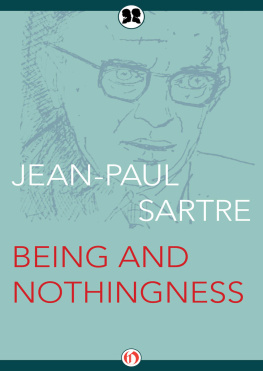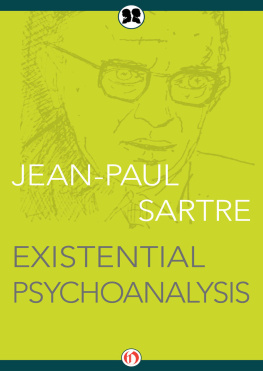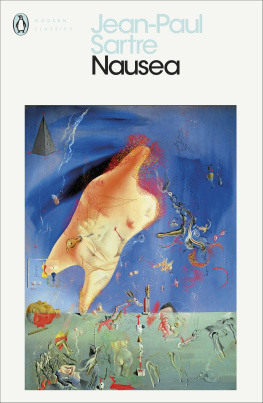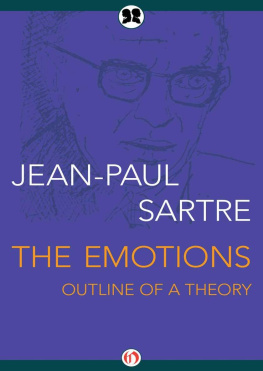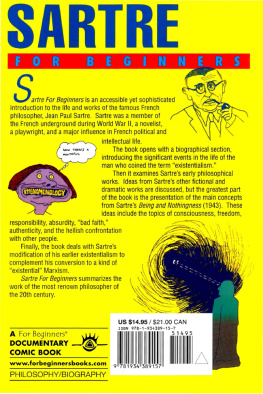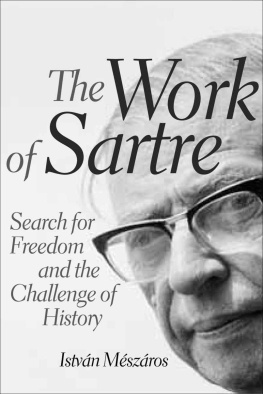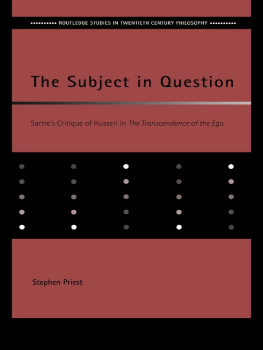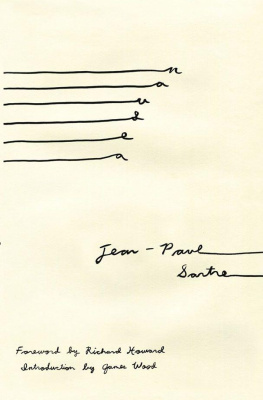What Is Subjectivity?
BY
JEAN-PAUL SARTRE
Translated by David Broder and Trista Selous
Introduction by Michel Kail and Raoul Kirchmayr
Afterword by Fredric Jameson

The translation of this book was supported by
the Centre National du Livre (CNL)

First published in English by Verso 2016
First published as Quest-ce que la subjectivit?
Editions les Prairies Ordinaires 2013
Marxism and Subjectivity, translation Trista Selous 2016
Balance of text, translation David Broder 2016
Introduction Michel Kail and Raoul Kirchmayr 2016
Afterword Fredric Jameson 2016
All rights reserved
The moral rights of the authors have been asserted
1 3 5 7 9 10 8 6 4 2
Verso
UK: 6 Meard Street, London W1F 0EG
US: 20 Jay Street, Suite 1010, Brooklyn, NY 11201
versobooks.com
Verso is the imprint of New Left Books
ISBN-13: 978-1-78478-137-8 (PB)
ISBN-13: 978-1-78478-140-8 (HB)
ISBN-13: 978-1-78478-138-5 (US EBK)
ISBN-13: 978-1-78478-139-2 (UK EBK)
British Library Cataloguing in Publication Data
A catalogue record for this book is available from the British Library
Library of Congress Cataloging-in-Publication Data
A catalog record for this book is available from the Library of Congress
Typeset in Sabon MT by Hewer Text UK Ltd, Edinburgh, Scotland
Printed in the US by Maple Press
Contents
Sartre gave the talk that you are about to read at Romes Gramsci Institute in December 1961, not long after he had published his Critique of Dialectical Reason in April 1960. This great theoretical work organised a confrontation with Marxism, founded on the paradoxical appreciation that Marxism has come to a standstill
Why did this lecture take place in Rome and not in Paris? There was next to no chance of Sartre being invited to speak by the French Communist Party (PCF) after his 1956 condemnation of the Soviet invasion of Hungary, whereby he renounced the fellow traveller status that he had taken on in 1952. Conversely, with its concern for cultural and intellectual openness the Italian Communist Party (PCI) did not fail to pay attention to Sartres work. The political scientist Marc Lazar has highlighted the fact that while the PCF at best afforded its intellectuals an expert role, the PCI encouraged them to intervene in defining policy itself: Despite the conflicts that broke out between the leadership and the intellectuals in certain periods, for instance during the Cold War, these scholars reflections did contribute to the development of Party policy, especially their elaborations in the context of the Gramsci Institutes. This intellectual presence in the Party leadership principally meaning the involvement of philosophers and historians encouraged the flowering of theoretical and cultural discussions therein. so we can understand why such an institute would have been keen to hear the author of the Critique of Dialectical Reason.
Right from the start of his intervention, Sartre declared his ambition of putting subjectivity at the heart of Marxist analysis, giving it back its lost energy. At the same time, he mounted a virulent critique of Lukcs, whose most important work, History and Class Consciousness (1923), many people, then as now, interpreted as having responded to this same ambition.
Lukcss presence in Sartres reflections is undeniable. Hence in his Search for a Method mistakenly citing this work as Existentialism and Marxism (a lapsus that is not without a certain charm, and is doubtless also of some significance for our remarks here). In this mediocre text, the Hungarian philosopher denounced existentialism essentially, Sartres existentialism as a new avatar of idealism, which he presented as nothing other than the ideological weapon that the bourgeoisie wields in order to defend its legitimacy. Lukcs unconvincingly tried to distance himself from scientism and boasted of having developed a materialism that was free of mechanicism, in that it grasped the essence of realities as they evolved and not statically. Yet this in fact offered no escape from scientism, since for Lukcs each stage of this evolution is reflected in consciousness passively.
We ought to note, however, that across the 1960s and 1970s French readers did increasingly turn to Lukcss History and Class Consciousness, Both orthodox Marxism which accused Lukcs and Korsch of revisionism, idealism and reformism and social democracy condemned these works with similar vigour. As Kostas Axelos reminds us, the inspiration for these critiques of Lukcs and Korsch was the cult of scientism the objectivity of the natural sciences underpinned by a crude realist definition of truth as the adequation of representations to the objects outside of them.
Lukcss project was to capture the totality of the social and historical experience that plays out by means of social praxis and the class struggle. The category that could be used to understand this process was mediation, which establishes the connection between the immediacy caught up in facticity and the totality-in-becoming, allowing for a permanent process of transcendence. The Party, equipped with a total conscious will, is able to unite theory and praxis, determining the form [Gestalt] of proletarian class consciousness. For Lukcs, this is connected to an analysis of the reification that transforms everything that is into commodities and assigns everything to a rationalist pseudo-objectivity or to an idealist pseudo-subjectivity. The world the totality engendered by human production is now foreign to consciousness. The capitalist mode of production drives reification to its paroxysm; the proletariats task is to put an end to it, through its party.
In the section entitled Class Consciousness
These considerations led Lukcs to reproach the vulgar Marxists for not having understood that only for the proletariat is an understanding of the essence of society a decisively important weapon, and that this exclusivity owes to the unique function that class consciousness fulfils for this class: it gives the proletariat the possibility of apprehending society, from the centre outward, as a coherent whole, and, in tandem with this, the possibility of acting centrally on it; proletarian class consciousness reconciles theory with practice.
In a work in which he mounts a very sharp critique of Sartre,
Sartre could have contented himself with the elements of Lukcss argumentation that we have described and Merleau-Pontys evaluation of them, thus recognising Lukcs as a thinker of subjectivity and an adversary of the Marxism that settles for placing the so-called objective conditions in a supposedly dialectical movement. All the more so because Sartre emphasised the pertinence of Lukcss diagnosis of the Marxism that had come to a standstill a voluntaristic idealism and also shared the Hungarian philosophers themes of consciousness and totality.
So where did Sartres reticence come from? In his lecture Sartre presents subjectivity in terms of its two traits of both not-knowing and having-to-be. These were two characteristics familiar to readers of The Transcendence of the Ego (1936) and Being and Nothingness (1943), leaving no doubt as to the remarkable continuity in the intuitions that inspired Sartres work.


